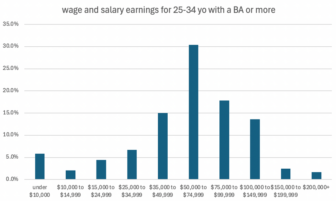
In a previous post we explored the huge B.A. earnings premium for 25-34 year olds. In this post I want to explore how well 25-34 year old African Americans with a four-year degree or more do in the labor market compared to other African Americans with lower education attainment and compared to whites.
The data come from the 2019 Current Population Survey. I looked at work earnings for what CPS describes as black alone and white alone. Work earnings are the total amount of money income one earns from any job. So, it includes all jobs one worked including payroll jobs, so-called gig jobs, jobs as a contractor and self-employment earnings as well as all money income earned at a job including overtime pay and bonuses.
The story the data tell is that 25-34 African Americans earn less than whites at every education attainment level, including those with a four-year degree or more. And that 25-34 year old African Americans with a B.A. or more earn substantially more than 25-34 year old African Americans without a four-year degree.
In 2018 25-34 year old African Americans with a B.A. or higher had median earnings from work ($42,280) of 170 percent of those with a high school degree ($24,801) and 131 percent of those with an Associates Degree ($32,291).
Just as it is for all workers, the reality is for 25-34 year old African Americans the higher the education attainment the higher the work earnings as you move up the education attainment ladder. With the biggest step being between those with an Associates Degree and those with a B.A. or more, with medians $10,000 higher annually. The median premium for those with a Bachelors Degree or more compared to a high school degree is more than than $17,000 a year. The median premium for an Associates Degree compared to a high school degree is more than $7,000 a year.
The advantage African Americans get from earning a four-year degree or more is even greater for 35-44 year olds. Where the median for African Americans with a B.A. or more is $60,423 compared to $40,090 for those with an Associates Degree and $27,313 for those with a high school degree. This is the core earnings premium story for all with a B.A. or more: the earnings premium starts big and grows larger throughout one’s forty-year career.
So the story we are told over and over again for today’s students that getting a four-year degree is no longer a good value for many is not true for African Americans, just as it is for all students.
But what is true, and troubling, is that 25-34 year olds black alone make substantially less than 25-34 year olds white alone at every level of education attainment. 25-34 year old blacks alone with a B.A. or more have median work earnings more than $10,000 less than whites alone. For those with an Associates Degree the black/white gap is $4,000, for those with some college but no degree it is $1,000 and for those with a high school degree it is $7,000.
25-34 year old African Americans with a B.A. or more do earn more that whites with lesser education attainment. Medians $6,000 higher than whites with an Associates Degree and $10,000 higher than whites with either some college, no degree and a high school degree.
As we explored previously thinkLaw’s Colin Seale got it exactly right when he wrote:
Lastly, it is hard to hear experts claim that college is no longer necessary without asking a clarifying equity question: college is no longer necessary for whom? The over-representation of students representing the 1% of the wealthiest families in the United States at elite institutions suggests that college is still necessary for this overwhelmingly white population. Maybe they value the undeniable boosts to social capital resulting from being part of alumni networks that create lifelong connections that span generations. Perhaps they appreciate the intangible, but priceless benefits a broad liberal arts foundation provides, like equipping students for the 21st century challenge of solving problems across disciplines. Affluent families are allegedly willing to lie, cheat and pay boatloads of cash to get their children into selective colleges, apparently owning the fact that merit is less important than access. It is inequitable to support a “college isn’t for everyone” mentality that treats higher education as an obvious expectation for students from privileged backgrounds and as a luxury good for others.







